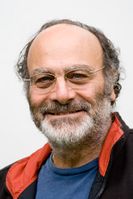Abboud, G.: Difference between revisions
m (Text replace - "publicationtype" to "classification") |
m (Text replacement - "{{Footer}}" to "") |
||
| (2 intermediate revisions by 2 users not shown) | |||
| Line 1: | Line 1: | ||
{{Person | {{Person | ||
| | |images=File:Abboud, Gerardo-Google-Jan 28, 2015.jpg | ||
|namefirst=Gerardo | |||
|namelast=Abboud | |namelast=Abboud | ||
|bornin=Buenos Aires, Argentina | |bornin=Buenos Aires, Argentina | ||
|bio=Gerardo Abboud was born in Buenos Aires, Argentina, and starting in the early 1970s, lived in India and Nepal for fourteen years. Since 1986, Abboud has been president of the Dongyuling Center, Argentina, which offers free teachings on Buddhist theory and practice. He is the English interpreter for several Kagyu lamas and since 1992 has served as the Dalai Lama’s interpreter in Latin America. | |bio=Gerardo Abboud was born in Buenos Aires, Argentina, and starting in the early 1970s, lived in India and Nepal for fourteen years. Since 1986, Abboud has been president of the Dongyuling Center, Argentina, which offers free teachings on Buddhist theory and practice. He is the English interpreter for several Kagyu lamas and since 1992 has served as the Dalai Lama’s interpreter in Latin America. | ||
|affiliation=Dongyuling Center, Argentina | |affiliation=Dongyuling Center, Argentina | ||
|languageprimary=Spanish | |languageprimary=Spanish | ||
|languagetranslation=Tibetan | |||
|languagetarget=Spanish; English | |languagetarget=Spanish; English | ||
| | |IsInGyatsa=No | ||
| | |classification=People | ||
|persontype=Translators; Authors of English Works; Authors of Spanish Works | |||
}} | }} | ||
== Other Information == | == Other Information == | ||
| Line 21: | Line 21: | ||
In 1986, Abboud was nominated president of the Dongyuling centre, which offers free teachings of Buddhist theory and practice. “People come for the meditation sessions even when they don’t know the theory because they like the sound of mantras or the feeling it gives you.” | In 1986, Abboud was nominated president of the Dongyuling centre, which offers free teachings of Buddhist theory and practice. “People come for the meditation sessions even when they don’t know the theory because they like the sound of mantras or the feeling it gives you.” | ||
Latest revision as of 14:26, 5 June 2024
| FirstName / namefirst | Gerardo |
|---|---|
| LastName / namelast | Abboud |
| bio | Gerardo Abboud was born in Buenos Aires, Argentina, and starting in the early 1970s, lived in India and Nepal for fourteen years. Since 1986, Abboud has been president of the Dongyuling Center, Argentina, which offers free teachings on Buddhist theory and practice. He is the English interpreter for several Kagyu lamas and since 1992 has served as the Dalai Lama’s interpreter in Latin America. |
| BornIn | Buenos Aires, Argentina |
| languageprimary | Spanish |
| languagetranslation | Tibetan |
| languagetarget | Spanish; English |
| affiliation | Dongyuling Center, Argentina |
| IsInGyatsa | No |
| Other wikis |
If the page does not yet exist on the remote wiki, you can paste the tag |
Other Information
http://www.argentinaindependent.com/tag/gerardo-abboud/
His Holiness the Dalai Lama's interpreter in South America since 1992.
Abboud was born in Buenos Aires into a Christian family. The former engineer left his work as Ford’s financial analyst in the 70s to move to India because “that’s where everyone was going at the time” but also because something was missing from his life.
In 1986, Abboud was nominated president of the Dongyuling centre, which offers free teachings of Buddhist theory and practice. “People come for the meditation sessions even when they don’t know the theory because they like the sound of mantras or the feeling it gives you.”

